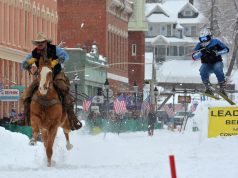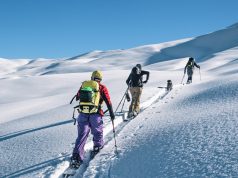
One of the more poignant memoirs I’ve read concerns a group of French soldiers in World War I. The men lost their way en route to the battlefield and mistakenly ascended a high, steep ridge. From that unintentionally safe vantage point, they witnessed the horrendous slaughter of their comrades in the valley below. The soldier who recollected the incident contrasted the haven of the hills with the murderous scene below in graphic detail and dreamlike serenity. Captured in that moment was the provocative, helpless, bittersweet grace of immunity.
By no means do I aim to invoke the gravity of trench warfare when describing the recent catastrophic Fourmile fire. However, my own experience shares a similar theme: vibrant, anxious isolation and a jarring sense of safety echoing in small degree the sentiment of those misguided soldiers.
It was Sept. 6, and I had just summited Bard Peak out of Watrous Gulch in the company of my border collie, Fremont. Our goal was to traverse four 13,000-foot peaks, and from the summit of Bard, we could see our final destination, 13,352-foot Engelmann Peak. The cloudless sky blazed a bright, ozone-blue and a fierce wind bullied us as we trekked from ridge to ridge. No trails, no other hikers, only the demoralizing and malicious wind keeping us company. Gusts generated by a recent cold front roared up west-facing gullies, producing an unnerving, menacing, deep hum. While casually orienting myself to our proposed summits, I first saw the enormous plume of smoke seemingly superimposed on the deep blue canvas of sky to the east.
The momentary shock of the unexpected scene gave way to analysis of the choking cloud, whose hue was rapidly shifting from soft, gray fluff to grim, uniform black. The gradient into darkness was particularly disturbing; it meant more than trees were caught in the inferno. I struggled to place the fire — too far east to be Winter Park, too close to be Boulder. Maybe somewhere south of Nederland? All I knew was I was miles away and safe beyond measure. Vivid red plants and green grasses blended with the deeply saturated blue sky, creating a dreamlike, alpine atmosphere. We continued our hike, the ever-growing cloud looming like a bad memory on the eastern horizon.
In this era of instant information, I was without connection to the outside world, yet I had a unique and unexplained view of something profound as it unfolded. Smoke pumped from the crucible with profane indifference and I, free of threat, bore witness to the incineration of irreplaceable memories.
The conclusive sensation was that of simulated enlightenment, a sentiment I had first acknowledged as a child imagining gazing down from the lofty clouds of heaven on the soulless pets and friends I loved, eternally bound in the fires of hell. Having shed those illusions of youth, the empty reward of safety still wells up when passing car wrecks or in the company of the terminally ill. There is undoubted gratitude, the selfish “better him than me” mentality, but also sympathy and injustice.
Much like the French troops, I was completely safe, a mere observer to misery. Going home meant to confront the darkness and to detach myself from the mountainous sanctuary — to wander into battle. Impregnable safety in an unsophisticated notion, one that evolves into daring empathy.
Mountaintops only offer us glimpses of elevated awareness; we cannot stay. Home was somewhere in the billowing smoke, and I took a deep breath of clean, unpolluted air before descending to the beacon that enigmatically draws one willingly into chaos.
Respond: [email protected]














